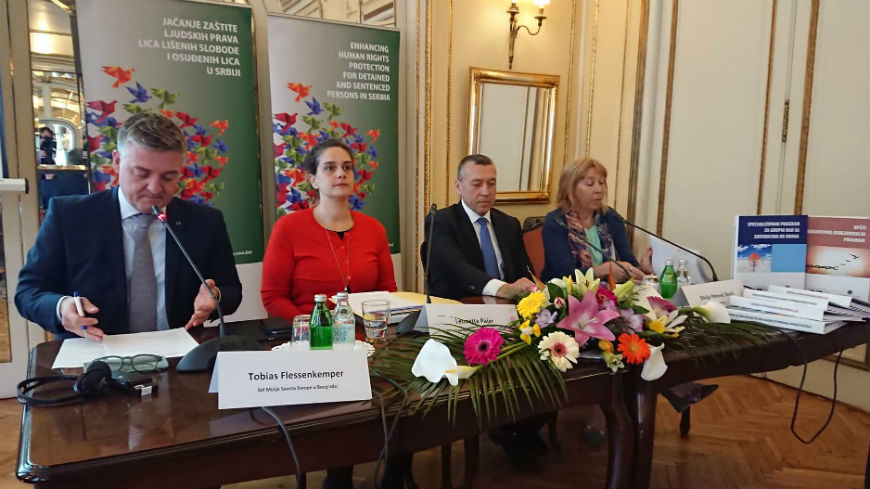Detained and sentenced persons in Serbia will have better treatment in prison and will be better prepared for their release after serving their sentence thanks to the joint EU and Council of Europe Action “Enhancing human rights protection for detained and sentenced persons in Serbia”. This was concluded during a round table on prison treatment programmes, held in Belgrade on 8 May.
Within this joint Action that started in 2017, the prison system of Serbia has been supported to develop two specialised treatment programmes for sentenced and detained persons in line with the European and other international standards. One of general nature, aiming at changing criminal ways of thinking, regulating feelings and learning socially acceptable behaviours, while the second one aiming at eliminating drug addiction and changing the addictive way of life related to committing crimes.
Both these treatment programmes were successfully piloted in six institutes for the enforcement of criminal sanctions and the programmes’ expansion to other institutions is foreseen.
Tobias Flessenkemper, the Head of the Council of Europe office in Belgrade congratulated the beneficiary institutions and partners on the successful implementation of the programmes. “This year we are celebrating the 70th anniversary of the Council of Europe and I am glad to acknowledge an important step, a building block in the protection and promotion of human rights, linking standard-setting and monitoring - work of the Committee for the Prevention of Torture and technical assistance. Efforts within this action led to great achievements,” he said.
The Director of Prison Administration within the Ministry of Justice, Dejan Carevic, emphasized that the goal is to start working with detained and sentenced persons on the first day of their arrival in prison. “The work of the Service for Treatment in Penitentiary Institutions is established in accordance with the rules of advanced European prison systems, which aims to successfully integrate imprisoned persons into the society. This is a demanding and complex process. Our goal is to discover the causes of incriminated behaviour, to face the sentenced with the causes, to increase their self-criticism and to strengthen their motivation for a change”, Mr Carevic concluded.
The Head of Operations Section I - Justice, Home Affairs and Social Inclusion of the Delegation of the European Union to Belgrade, Leonetta Pajer highlighted the importance of strengthening the human rights of detained and sentenced persons. “These programmes go to the core of social values and treatment programmes have immediate effect, as it was confirmed in practice,” she said. “I would like to specially commend the involvement of 14 members of the working group. Without their dedication, this level of local ownership would be impossible to achieve”, she concluded.
This round table was organised within the Action “Enhancing human rights protection for detained and sentenced persons in Serbia”, which is part of the programme "Horizontal Facility for the Western Balkans and Turkey", co-funded by the European Union and the Council of Europe and implemented by the Council of Europe.



